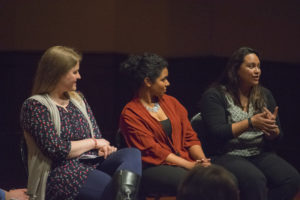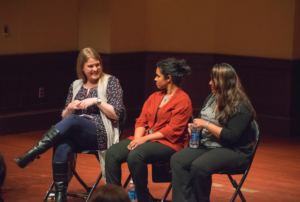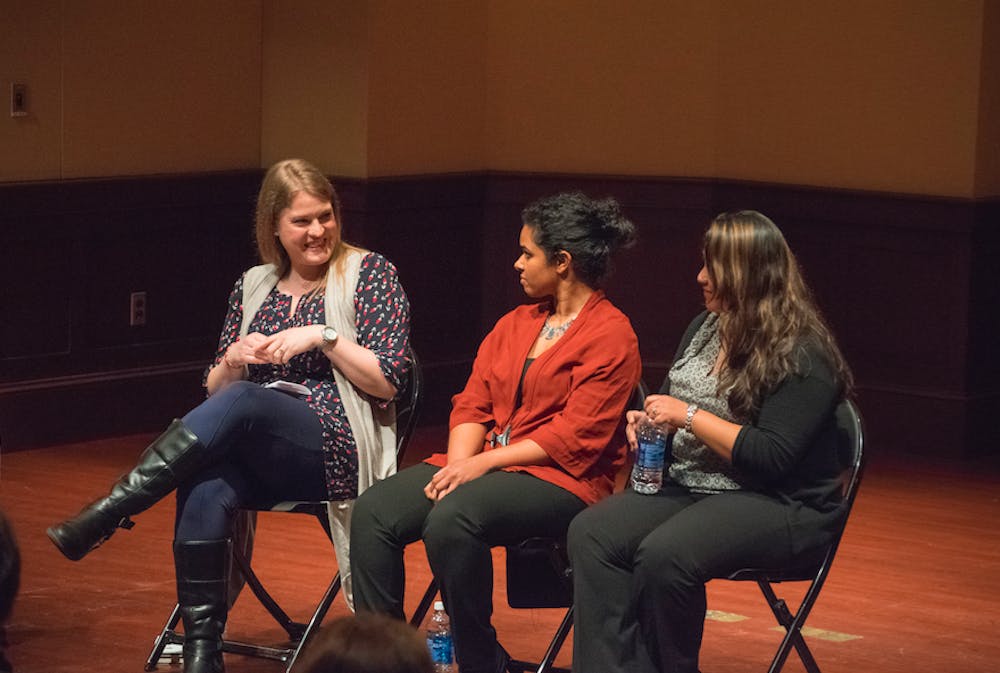By Alyssa Gautieri
Features Editor
“What change do you want to make and how?”
That is what alumna Johanna Calle (’08) asked the students gathered in the Library Auditorium on Thursday, April 6.
The third workshop in the “Activism 101 & 102 Series” featured a panel of three alumnae currently employed as activists. The women shared what it is like to work with nonprofits, their personal experiences with activism and advice for those aspiring to enter the social justice field.
Calle, who attended the College as an undocumented immigrant, is now the program coordinator at New Jersey Alliance for Immigrant Justice.
“I think everyone has a different definition of how they can create change,” she said. “You have to check your gut and decide where on the spectrum you feel comfortable and where you can make a change.”
Calle began her college career as a physics and education double major, but quickly realized that track wouldn’t allow her to change the world. She then decided on a sociology and political science double major and later pursued a master’s in criminal justice at Rutgers University-Newark.

“What counts as activism? Who is an activist and what makes it legitimate?” asked alumna Karina Lopez (’11), the community engaged learning coordinator for the Bonner Institute’s Juvenile Justice and Prisoner Reentry Division.
Also an army reservist for seven years, Lopez began her career at the College as a biology major, but soon switched to philosophy and women’s and gender studies. At the College, Lopez was involved with the Bonner Community Scholars, Women In Learning and Leadership and the Educational Opportunity Fund Program.
“All of the programs that I was involved with (at the College) helped to further shape my love for social justice and gave me the words in which I could really speak about social justice,” she said.
In her current position, Lopez works with students at the College.
“Essentially, we want to cultivate social justice leaders so that when they leave TCNJ they will be able to impact the world,” Lopez said. “I feel that I am more of an activator because I work with the future of our country.”
Alumna Caitlin Duffy (’12), senior associate for learning and engagement at the National Committee for Responsive Philanthropy, studied Spanish and secondary education at the College. After working with immigrant and hispanic communities, she decided to pursue a master’s in ethics, peace and global affairs at American University.

The time for social change is now, according to Duffy.
“While there has always been an urgency (for change), right now there is so much more immediate necessity to fund activism and civic engagement,” she said.
The women also shared insight into the governmental challenges of nonprofits.
“I think nonprofit organizations are part of the problem,” Lopez said. “It is not a coincidence that the same institutions that are taking away a lot of essential rights and protections are the ones that are giving nonprofits money.”
Calle agreed that the system is flawed.
“It is a very complicated system, you can lose your way if you don't know what you need and what you want,” she said.
Calle was also not shy about criticizing the College.
Around two years ago, the College called Calle, asking her to make a donation. Calle responded with an ultimatum.
“I told them ‘I will donate my money if you create a fund for undocumented students’ and they never called back,” she said.
Frustrated that the College does not address its undocumented students, Calle believes the student body needs to start the conversation.
“You have undocumented students on campus,” she said. “And no one is talking about it and that means that we have to start making people uncomfortable to start building consciousness across the study body.”
Students looking at a range of colleges are likely to make a decision based on where each college stands on their values.
“Don’t come here until this school starts representing the values of its students,” Calle said.
Lopez also brought up the importance of the student body.
“TCNJ students are the College’s consumers,” she said. “If you guys organize well and if you have a large number of students behind you, it is really difficult for administrators to not listen. Without students, the College couldn't exist.”
Teresa Anta San Pedro, a retired Spanish professor in the audience, agreed.
“If you see something that is unjust, you should not just keep quiet,” she said. “The minute you see something and you don’t do something about it, it will only keep going.”
Duffy invited students to think about their desire to change the world.
“When people say, ‘I want to help people’ or ‘I want to change the world,’ that is really broad,”
she said. “I want to challenge you to think about what specifically you want to change.”







